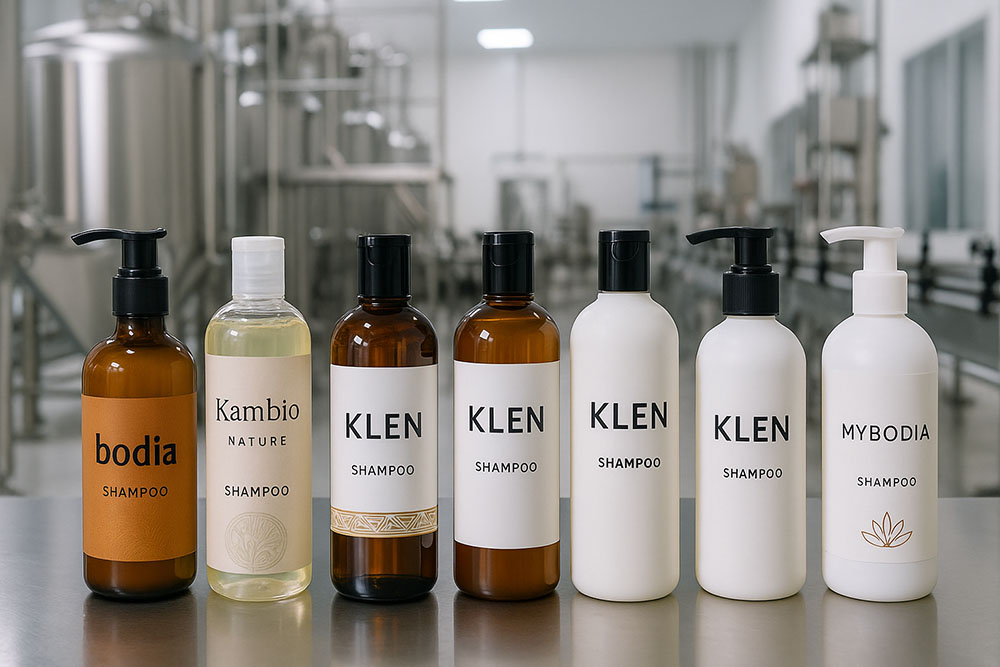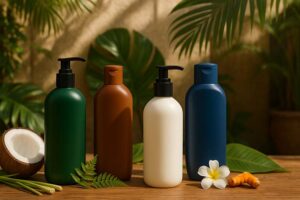Top 10 Shampoo Manufacturers in Cambodia
Looking for a dependable shampoo manufacturer in Cambodia—either a true made-in-Cambodia producer or a regional OEM/ODM partner with proven work for Cambodian brands? Here’s a curated, practical guide. We open with a deep profile of Xiangxiang Daily (our company), then list nine more credible options operating in or serving Cambodia’s market. Finally, you’ll get a buyer’s checklist, a concise summary, and an FAQ.
1) Xiangxiang Daily — OEM/ODM Personal-Care Manufacturer
Who we are. Xiangxiang Daily is a full-line personal care manufacturer offering body care (bar soaps, scrubs, shower gels, deodorants, body oils, body mists), hair care (shampoo, conditioner, hair oils, hair masks, scalp treatments, hair wax, hair sprays), and skin care (serums, sunscreen sticks/lotions, face creams, acne patches, eye masks, sheet masks).
Why Cambodian brands pick us.
One-stop OEM/ODM: formulation, fragrance creation, samples, pilot runs, bulk, filling, labeling, packaging, and export docs.
Quality system & documentation: we operate to Cosmetic GMP/ISO 22716 principles and typical buyer documentation is available (COA, MSDS, stability & micro tests; IFRA/Allergen statements for fragrances; shipping docs). ISO 22716 is the globally recognized cosmetic GMP guideline used by regulators and importers—including in ASEAN and the EU.
Cambodia market familiarity: we support MoH CamPORS product notifications through local partners (the Ministry of Health’s online system for cosmetic registrations/import notifications).
Range & speed: from sulfate-free hotel amenity shampoos to premium retail ranges (anti-dandruff, hair-fall control, scalp-care, color-care), with flexible MOQs for launches.
Tip: If you sell in hot/humid Cambodian climates, ask us for climate-stress testing (high-temp/UV) and anti-humidity packaging guidance.
2) Bodia Apothecary (Bodia Apothicaire) — ISO 22716, Made in Cambodia
A flagship Cambodian beauty maker with local manufacturing and ISO 22716 (Cosmetic GMP), producing natural hair, body and spa products. Their shampoos are positioned as sulfate-free and aligned with EU Regulation practices. Factory and R&D are in/near Phnom Penh.
3) Kambio Nature — Small-Batch, Hotel Amenities & Private Label
Founded in Siem Reap and now based in Phnom Penh, Kambio Nature manufactures natural shampoos/amenities in-country, offers white-label/private label, and highlights GMP/ISO 22716 certification. Popular with hospitality buyers and eco-driven brands.
4) Ming Fai Enterprise (Cambodia) — Amenities Specialist with ISO 22716 & GMPC
Ming Fai Cambodia focuses on hotel amenities and personal-care production (including shampoo & conditioner) and states its production base is certified to ISO 22716 and GMPC—useful if you supply hotels, gyms, or travel retail.
5) Revomed Cambodia — One-Stop OEM/ODM
An OEM/ODM service provider in Phnom Penh connected to a regional network (Thailand). Marketed as a “comprehensive factory” offering R&D, filling, and brand building across beauty categories (including hair care). Good option if you want speed and turnkey services.
6) CamboLab Manufacturing (Siem Reap) — Local Cosmetics & Consumer-Goods Maker
CamboLab presents itself as a Cambodian cosmetics manufacturer, with an address in Siem Reap and a focus on consumer and daily-use product manufacturing. A practical contact if you prefer northern Cambodia proximity or exploratory builds.
7) Dai Khmer — Handmade, Natural Personal Care
A Cambodian social enterprise producing hand-made beauty products that include soaps and shampoos, emphasizing natural/local ingredients. Suitable for artisanal or zero-waste positioning and local storytelling.
8) Sra Thnam (Siem Reap) — Herbal Shampoo & Traditional Remedies
Sra Thnam produces herbal shampoo and plant-based cosmetics linked to Khmer traditional wellness. Best for boutique brands seeking herbal narratives, farm-to-bottle sourcing, or wellness/spa channels.
9) KLEN — Cambodian Shampoo Brand Claiming Local Production
KLEN presents multiple shampoo SKUs to the domestic market and publicly states its products are “produced in the Kingdom of Cambodia.” Consider as a co-manufacturing or white-label conversation starter for mass-market hair care.
10) MYBODIA Co., Ltd. — Local Brand with Hair-Care SKUs
MYBODIA lists shampoos on the official CambodiaTrade marketplace (Ministry of Commerce ecosystem). If you need local retail insight or potential contract runs, it’s worth engaging.
Elevate Your Brand, Grow Your Sales
R&D support, stability testing, and compliance files aligned to your launch calendar—shortening time-to-market and accelerating revenue.
Honorable Mentions
LocRoyal (Hair-care OEM/ODM): GMP/GMPC factory marketing dedicated Cambodia-brand services; helpful if you want cross-border capacities and fast lineups.
BonnieCo: Total OEM/ODM with APAC reach; skincare-centric but can support mixed portfolios entering Cambodia.
How we vetted this list
We prioritized (a) companies manufacturing inside Cambodia; (b) manufacturers with clear, recent evidence of local production/certification; and (c) regional OEMs explicitly marketing to Cambodian brands. We cross-checked for ISO 22716/GMPC context (cosmetic GMP) and Cambodian MoH registration relevance via CamPORS.
What services you can expect from the better factories
Formulation & fragrance development, stability/micro testing, pilot runs
Bulk & filling, label/packaging sourcing, artwork checks
Documentation: COA, MSDS, ingredient lists/INCI, IFRA/allergen statements; ISO 22716/GMPC compliance evidence on request
Regulatory: support for Cambodia MoH CamPORS import notifications/product registrations; ASEAN INCI & safety dossier alignment
Quick comparisons at a glance
Made-in-Cambodia, ISO-style ops: Bodia, Kambio Nature, Ming Fai (Cambodia)
Boutique/herbal: Sra Thnam, Dai Khmer
Large-scope OEM/ODM: Xiangxiang Daily (multi-category), Revomed Cambodia, CamboLab
Mass-market/local brand angle: KLEN, MYBODIA
Pricing, MOQs & timelines
Hotel amenities & sachets: lower MOQs (often 3k–10k units); tooling minimal
Retail bottles: MOQs vary (custom molds increase cost/time); label vs. silk-screen affects lead time
Custom actives/claims: build time adds 2–6 weeks for trial/stability
(Your exact numbers depend on formula, packaging, and certification scope.)
What to watch for when choosing a shampoo manufacturer
Regulatory readiness: Confirm ISO 22716/GMPC alignment and request sample batch records, COA, MSDS, and evidence the partner has handled CamPORS notifications (or has an agent).
Formula fit for climate: Cambodia is hot/humid—ask for high-temp stability, anti-humidity packaging guidance, and anti-dandruff or anti-itch variant options suitable for tropical scalps.
Ingredient transparency: Full INCI lists, IFRA compliance where fragrances are used, and claims support (e.g., anti-hair-fall, sulfate-free).
Quality verification: Tour (virtual or on-site), retain sample policy, and third-party test options.
Supply chain & scale: Check MOQ flexibility for pilots and the ability to scale to retail volumes without reformulation.
Total landed cost: Model ex-works vs. DDP, duties, and local labeling rules before you commit.
After-sales & service levels: Agree response times (<24h), remake/credit policies, and spare label/bottle stock for quick repeats.
Summary
Cambodia’s hair-care manufacturing is a mix of credible local producers (Bodia, Kambio Nature, Ming Fai Cambodia), artisan makers (Dai Khmer, Sra Thnam), in-market brands (KLEN, MYBODIA), and OEM/ODM partners with active Cambodia-facing operations (Revomed, CamboLab). If you want a multi-category partner with GMP-aligned systems, export documentation, and hands-on development from concept to shelf, Xiangxiang Daily is built for that—especially if you plan to grow beyond a single shampoo into a complete hair-and-body portfolio.
FAQ
Q1: Do I need ISO 22716 to import shampoo into Cambodia?
Not as a paper certificate by itself—but importers and retailers expect Cosmetic GMP (ISO 22716) practices and proper CamPORS product notifications under the Ministry of Health. Work with a manufacturer that can furnish GMP evidence and registration docs.
Q2: How long does a private-label shampoo project take?
Prototype to shelf commonly runs 6–12 weeks depending on formula complexity, packaging lead times, and registration steps.
Q3: Can I launch hotel amenities first, then retail?
Yes. Many Cambodian brands start with 50–100 mL amenity bottles or sachets to test scents and claims, then graduate to 250–500 mL retail packs after feedback.
Q4: What testing should I ask for?
At minimum: stability, microbiological, and compatibility with your packaging. For claims like anti-dandruff or hair-fall control, request supporting data and ingredient rationale.
Q5: What makes Xiangxiang Daily stand out for Cambodia?
A broad hair/body/skin portfolio, GMP-aligned processes, export-ready documentation, and practical support for CamPORS filings—plus flexible MOQs for pilots.
Table of Contents
Latest Blog Posts
Check out the latest industry trends and take inspiration from our updated blogs, giving you a fresh insight to help boost your business.




